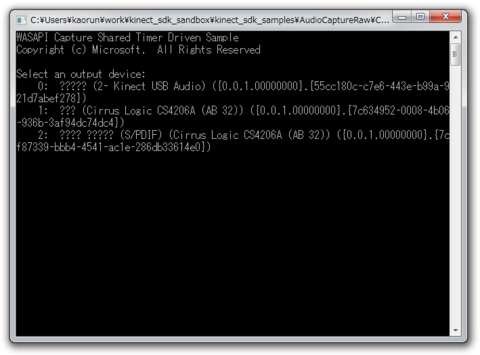やっとKinectのマイクにたどり着きました。。。サンプルを見てると、COM使いまくりでややこしくてなんとなく敬遠してました。
今回やったことは、Kinectのマイク入力をスピーカーからストリーミング出力することです。
スピーカー出力はやったことがなくていろいろ調べてて結局DirectXのXAudio2に落ち着きました。
環境
- Windows 7 64bit
- Visual Studio 2010 Premium
- Microsoft DirectX SDK (June 2010)
- ソース(プロジェクト一式)
参考
AudioCaptureRawサンプルに、こちらのストリーミング再生を入れました。ありがとうございます:-)
実行にあたって
Audioについて調べたこと
- DirectSound:最新のDirectXで提供されておらず断念
- OpenAL:OSSのマルチプラットフォーム音声ライブラリ。Kinectの入力WAVEフォーマットがWAVE_FORMAT_EXTENSIBLEであるが、これを入力にする方法がわからず断念
- XAudio2:今のDirectXではこれを使うらしい(XboxとWindowsとのクロスプラットフォーム)。Kinectのサンプルから出力したWAVEファイルを再生できたの採用
ソース
CWASAPICapture::DoCaptureThread のみの変更でいけました。とりあえず載せときます
DWORD CWASAPICapture::DoCaptureThread()
{
HANDLE mmcssHandle = NULL;
IXAudio2* xaudio = 0;
IXAudio2MasteringVoice* mastering_voice = 0;
IXAudio2SourceVoice* source_voice = 0;
try {
bool stillPlaying = true;
DWORD mmcssTaskIndex = 0;
HRESULT hr = CoInitializeEx(NULL, COINIT_MULTITHREADED);
if (FAILED(hr))
{
printf_s("Unable to initialize COM in render thread: %x\n", hr);
return hr;
}
mmcssHandle = AvSetMmThreadCharacteristics(L"Audio", &mmcssTaskIndex);
if (mmcssHandle == NULL)
{
printf_s("Unable to enable MMCSS on capture thread: %d\n", GetLastError());
}
//
// XAudioの初期化
//
{
UINT32 flags = 0;
#ifdef _DEBUG
flags |= XAUDIO2_DEBUG_ENGINE;
#endif
if( FAILED( hr = XAudio2Create( &xaudio, flags ) ) )
throw "XAudio2Create";
// Create a mastering voice
if( FAILED( hr = xaudio->CreateMasteringVoice( &mastering_voice ) ) )
throw "CreateMasteringVoice";
// WAVファイルのWAVEFORMATEXを使ってSourceVoiceを作成
if( FAILED( xaudio->CreateSourceVoice( &source_voice, MixFormat() ) ) )
throw "CreateSourceVoice";
// 再生
source_voice->Start();
}
while (stillPlaying)
{
HRESULT hr;
//
// In Timer Driven mode, we want to wait for half the desired latency in milliseconds.
//
// That way we'll wake up half way through the processing period to pull the
// next set of samples from the engine.
//
DWORD waitResult = WaitForSingleObject(_ShutdownEvent, _EngineLatencyInMS / 2);
switch (waitResult)
{
case WAIT_OBJECT_0 + 0: // _ShutdownEvent
stillPlaying = false; // We're done, exit the loop.
break;
case WAIT_TIMEOUT: // Timeout
//
// We need to retrieve the next buffer of samples from the audio capturer.
//
BYTE *pData;
UINT32 framesAvailable;
DWORD flags;
//
// Find out how much capture data is available. We need to make sure we don't run over the length
// of our capture buffer. We'll discard any samples that don't fit in the buffer.
//
hr = _CaptureClient->GetBuffer(&pData, &framesAvailable, &flags, NULL, NULL);
if (SUCCEEDED(hr))
{
UINT32 framesToCopy = min(framesAvailable, static_cast<UINT32>((_CaptureBufferSize - _CurrentCaptureIndex) / _FrameSize));
if (framesToCopy != 0)
{
//
// The flags on capture tell us information about the data.
//
// We only really care about the silent flag since we want to put frames of silence into the buffer
// when we receive silence. We rely on the fact that a logical bit 0 is silence for both float and int formats.
//
if (flags & AUDCLNT_BUFFERFLAGS_SILENT)
{
//
// Fill 0s from the capture buffer to the output buffer.
//
ZeroMemory(&_CaptureBuffer[_CurrentCaptureIndex], framesToCopy*_FrameSize);
}
else
{
//
// Copy data from the audio engine buffer to the output buffer.
//
CopyMemory(&_CaptureBuffer[_CurrentCaptureIndex], pData, framesToCopy*_FrameSize);
// SourceVoiceにデータを送信
XAUDIO2_BUFFER buffer = { 0 };
buffer.AudioBytes = framesToCopy * _FrameSize; //バッファのバイト数
buffer.pAudioData = &pData[ 0 ]; //バッファの先頭アドレス
source_voice->SubmitSourceBuffer( &buffer );
}
//
// Bump the capture buffer pointer.
//
_CurrentCaptureIndex += framesToCopy*_FrameSize;
}
hr = _CaptureClient->ReleaseBuffer(framesAvailable);
if (FAILED(hr))
{
printf_s("Unable to release capture buffer: %x!\n", hr);
}
}
break;
}
}
}
catch( const char* e )
{
std::cout << e << std::endl;
}
// Cleanup XAudio2
if( mastering_voice != 0 ) {
// ここで落ちる
//mastering_voice->DestroyVoice();
mastering_voice = 0;
}
if( xaudio != 0 ) {
// ここでも落ちる
//xaudio->Release();
xaudio = 0;
}
AvRevertMmThreadCharacteristics(mmcssHandle);
CoUninitialize();
return 0;
}
